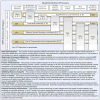Interagency Collaborative Team Model for Capacity Building to Scale-Up Evidence-Based Practice
- PMID: 27512239
- PMCID: PMC4976939
- DOI: 10.1016/j.childyouth.2013.10.005
Interagency Collaborative Team Model for Capacity Building to Scale-Up Evidence-Based Practice
Abstract
Background: System-wide scale up of evidence-based practice (EBP) is a complex process. Yet, few strategic approaches exist to support EBP implementation and sustainment across a service system. Building on the Exploration, Preparation, Implementation, and Sustainment (EPIS) implementation framework, we developed and are testing the Interagency Collaborative Team (ICT) process model to implement an evidence-based child neglect intervention (i.e., SafeCare®) within a large children's service system. The ICT model emphasizes the role of local agency collaborations in creating structural supports for successful implementation.
Methods: We describe the ICT model and present preliminary qualitative results from use of the implementation model in one large scale EBP implementation. Qualitative interviews were conducted to assess challenges in building system, organization, and home visitor collaboration and capacity to implement the EBP. Data collection and analysis centered on EBP implementation issues, as well as the experiences of home visitors under the ICT model.
Results: Six notable issues relating to implementation process emerged from participant interviews, including: (a) initial commitment and collaboration among stakeholders, (b) leadership, (c) communication, (d) practice fit with local context, (e) ongoing negotiation and problem solving, and (f) early successes. These issues highlight strengths and areas for development in the ICT model.
Conclusions: Use of the ICT model led to sustained and widespread use of SafeCare in one large county. Although some aspects of the implementation model may benefit from enhancement, qualitative findings suggest that the ICT process generates strong structural supports for implementation and creates conditions in which tensions between EBP structure and local contextual variations can be resolved in ways that support the expansion and maintenance of an EBP while preserving potential for public health benefit.
Keywords: Evidence-based practice; Implementation; Process Model; Sustainment; Teams.
Conflict of interest statement
The authors declare no other conflicts of interest.
Figures
Similar articles
-
Collaboration, negotiation, and coalescence for interagency-collaborative teams to scale-up evidence-based practice.J Clin Child Adolesc Psychol. 2014;43(6):915-28. doi: 10.1080/15374416.2013.876642. Epub 2014 Mar 10. J Clin Child Adolesc Psychol. 2014. PMID: 24611580 Free PMC article.
-
Implementation Science Research Examining the Integration of Evidence-Based Practices Into HIV Prevention and Clinical Care: Protocol for a Mixed-Methods Study Using the Exploration, Preparation, Implementation, and Sustainment (EPIS) Model.JMIR Res Protoc. 2019 May 23;8(5):e11202. doi: 10.2196/11202. JMIR Res Protoc. 2019. PMID: 31124469 Free PMC article.
-
Contracting as a bridging factor linking outer and inner contexts during EBP implementation and sustainment: a prospective study across multiple U.S. public sector service systems.Implement Sci. 2020 Jun 11;15(1):43. doi: 10.1186/s13012-020-00999-9. Implement Sci. 2020. PMID: 32527274 Free PMC article.
-
Systematic review of the Exploration, Preparation, Implementation, Sustainment (EPIS) framework.Implement Sci. 2019 Jan 5;14(1):1. doi: 10.1186/s13012-018-0842-6. Implement Sci. 2019. PMID: 30611302 Free PMC article.
-
Forms and functions of bridging factors: specifying the dynamic links between outer and inner contexts during implementation and sustainment.Implement Sci. 2021 Apr 1;16(1):34. doi: 10.1186/s13012-021-01099-y. Implement Sci. 2021. PMID: 33794956 Free PMC article. Review.
Cited by
-
Change in Collaborative Ties in a Children's Mental Health Services Network: A Clique Perspective.Hum Serv Organ Manag Leadersh Gov. 2019;43(2):74-91. doi: 10.1080/23303131.2019.1606871. Epub 2019 Apr 26. Hum Serv Organ Manag Leadersh Gov. 2019. PMID: 34026924 Free PMC article.
-
Design and baseline data of a randomized trial comparing two methods for scaling-up an occupational sun protection intervention.Contemp Clin Trials. 2020 Oct;97:106147. doi: 10.1016/j.cct.2020.106147. Epub 2020 Sep 15. Contemp Clin Trials. 2020. PMID: 32942054 Free PMC article. Clinical Trial.
-
Inter-agency collaboration is associated with increased frequency of research use in children's mental health policy making.Health Serv Res. 2022 Aug;57(4):842-852. doi: 10.1111/1475-6773.13955. Epub 2022 Mar 13. Health Serv Res. 2022. PMID: 35285023 Free PMC article.
-
Knowledge and attitudes of Implementation Support Practitioners-Findings from a systematic integrative review.PLoS One. 2022 May 11;17(5):e0267533. doi: 10.1371/journal.pone.0267533. eCollection 2022. PLoS One. 2022. PMID: 35544529 Free PMC article.
-
A controlled trial of implementing a complex mental health intervention for carers of vulnerable young people living in out-of-home care: the ripple project.BMC Psychiatry. 2016 Dec 7;16(1):436. doi: 10.1186/s12888-016-1145-6. BMC Psychiatry. 2016. PMID: 27927174 Free PMC article. Clinical Trial.
References
-
- Aarons GA, Palinkas LA. Implementation of evidence-based practice in child welfare: Service provider perspectives. Administration and Policy in Mental Health and Mental Health Services Research. 2007;34:411–419. - PubMed
Grants and funding
LinkOut - more resources
Full Text Sources
Other Literature Sources
Medical

